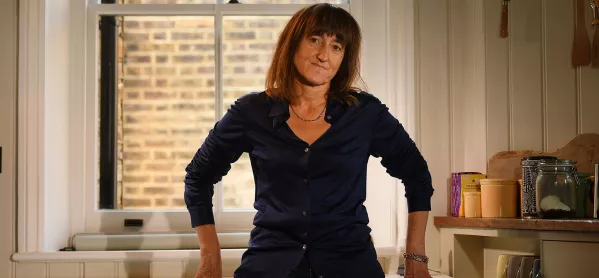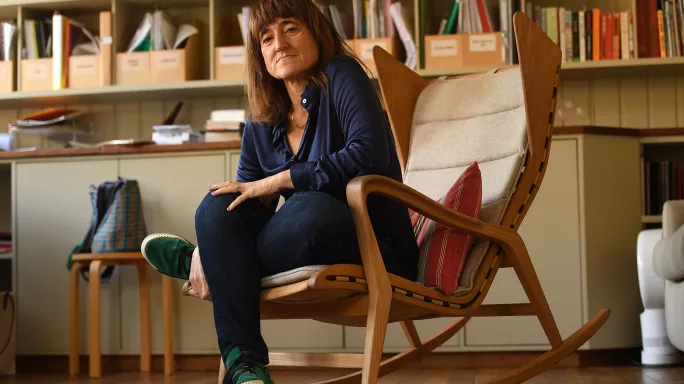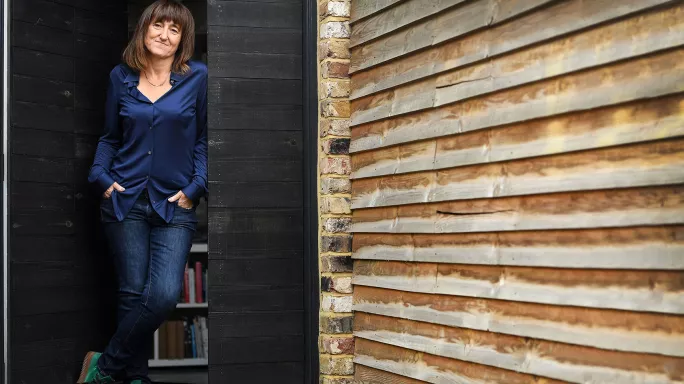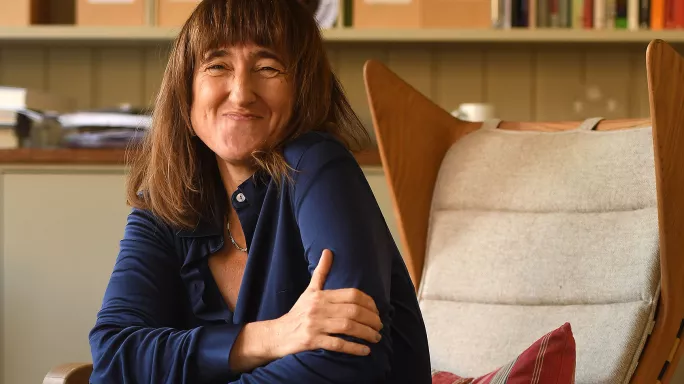The Tes profile: Children’s rights campaigner Beeban Kidron
Share
The Tes profile: Children’s rights campaigner Beeban Kidron
Baroness Beeban Kidron, the film director and children’s rights activist, has lots to say about creativity and education. But asking what she thinks of the role of arts education in school today is clearly the wrong question to kick things off.
“We seem to have the wrong end of the stick - school is not separate from life,” she insists. “[The question should not be about] the role of the arts in schools - it’s the role of the arts in life.”
Then there is the impact of technology to consider. As tech continues to change all of our lives, she explains, an international consensus is forming about the need for people to develop skills, such as creativity, critical understanding, empathy and collaboration, if they are to go on to thrive in work.
“We want people who are alert, thoughtful, can work together, can think about the meaning of images and words, and apply that to the situation they are in,” she says. “Where in the curriculum do you learn that? In the creative subjects and in creative approaches to other subjects.”
Kidron, 57, is perhaps best known for her Bafta-winning TV adaptation of Oranges Are Not the Only Fruit and the film, Bridget Jones: The Edge of Reason. But she has become increasingly connected to the world of education since co-founding Filmclub (now Into Film) 12 years ago to show films in schools, and later exposing the effects of an unregulated internet on teenagers in her 2013 film, InRealLife.
Now, her input is sought by many organisations, including the Royal Foundation Taskforce on the Prevention of Cyberbullying, and she is a commissioner on the UN Broadband Commission for Sustainable Development and the Durham Commission on Creativity and Education.
It is clear why: she has a wide-ranging curiosity, thinks deeply and has a frank turn of phrase.
“It’s so clear to me that we’re arse about face, in the way that we’re thinking about it [schooling],” she says, making clear that despite her many roles, today she is speaking purely for herself. ”We’re not thinking about what makes these modern people, what makes them able, swift, thoughtful and critical.”
She believes education should be about opening up the world to children, but despairs that this vision is being lost - and that debates about schooling have become polarised.
“My problem is not any single thing, but the direction of travel,” she says. “That module in maths is fine, that story in history is fine. It is [instead about the wrong] direction of travel, it is the foolishness of wanting a 19th century English gentleman’s education for a 21st century world.”
Giving voice to the unheard
Kidron’s own schooling began at a tiny village school, Lockington Primary, near Beverley in east Yorkshire, where she remembers waiting for the school bus with warm baked potatoes in her pockets.
Although she was born in London, her father, Michael - a Marxist writer - had taken a job as an academic at Hull University. Then, a few years after she started school, the family returned to London; Kidron remembers being shocked by the change in scale. She was plunged into Year 5 at Gospel Oak Primary, a busy inner-London school in Camden, then moved to Camden School for Girls.
But it was work, not school, that interested Kidron. She had a Saturday job at the Photographers’ Gallery and it was there that she met legendary photojournalist Eve Arnold. At 16, Kidron left school to work as Arnold’s assistant, later going on to the National Film and Television School.
Her career has included directing 19 films that tackle a remarkably wide range of subjects - from documentaries on the Greenham Common anti-nuclear protesters to co-producing last year’s hit, Victoria and Abdul, starring Dame Judi Dench. “If there is one thing that traverses this rather windy road I have taken, [it is that] it gives voice to those who might not have a place at the table,” she explained in an interview on Radio 3 last year.
But in the midst of her film career, she took a sidestep - co-founding Filmclub with journalist and educationalist, Lindsay Mackie. The move came at a time when teenagers were being characterised as materialistic “hoodies”, something that she said outraged her - it was hardly teenagers’ fault that they aspired to be consumers when they lived in a consumerist society.
“What I realised - and what was important to me - was that there is a bigger world,” she says. “What often captures children’s attention is the incredible feeling of seeing yourself as one of many, or forgetting yourself and seeing a broader set of circumstances…That is why I set up Filmclub because I thought films would leverage those other worlds for kids who may not, by themselves, find another world.”
There are now more than 11,400 Into Film clubs. The charity’s 2016-17 annual report reveals 97 per cent of club leaders think the clubs have increased members’ enjoyment of school and 80 per cent believe they have improved their literacy levels.
The ‘glorious privilege’ of teaching
And it isn’t only children upon whom the film clubs have had a profound effect. “I spent a lot of time in schools,” says Kidron of the project’s early years. “I loved it, and I thought ‘maybe it is ridiculous that I’m a film director, maybe I should be a teacher’.”
She admits that the thought of having to sit A levels, let alone a degree and teaching qualification, quickly quashed that thought. But she is clear about the attraction: “I loved that moment when you’re looking at a bunch of kids and you see one of them ‘get it’,” she says. “You say something and their world is different…What a glorious, privileged position to have in someone’s life.”
Although she didn’t opt to leave the day job, her respect for teachers remains undimmed.
“I have phenomenal respect for teachers,” she says. “I think it is a combination of valiant, inspirational and deeply unjust that all [teachers] have been given an increasing number of social goods to deliver, as well as education. So chapeau off to the teaching community. It’s a significant failure of the rest of government policy, civil society, industry, the rest of us, that teachers are left with so much to do. So much to deliver, so many gaps to fill, before they even start their day jobs.”
Now, as Baroness Kidron of Angel, she sits as a cross-bencher in the House of Lords, where she has spoken out on the EBacc, airing her opinion that it is “wrongheaded” to “arbitrarily create a tier of second-class subjects”.
But it is in the area of digital rights that she has had the biggest political impact. Her film, InRealLife, looked at the effects of internet use on teenagers. Making the film led Kidron to advocate the introduction of age-appropriate design for technology - so that designers would ensure higher standards for children in areas such as default privacy settings. And she has successfully lobbied for an amendment to the government’s Data Protection Act 2018 to ensure this will happen.
“At the moment, we have this mad situation where we keep on talking about resilient children and teachers have to deliver safety,” she says. “But what we need is a system that recognises childhood, that upholds the UNHCR [United Nations High Commissioner for Refugees] rights of childhood, that ensures all the legislative benefits that children have in every other context are applied and enforced - then the huge wave of bad that comes out [on the internet] will become a trickle.”
‘School’ settings on mobile phones
Kidron is avowedly pro- and not anti-tech. She wouldn’t ban mobile phones in schools, for example, as France has done, and as culture secretary Matt Hancock and Ofsted chief inspector Amanda Spielman have advocated in the UK.
“I don’t agree with that,” she comments. “You should have a school setting on mobile phones, so mobile phones can be used for things that are going on in school, like checking the internet, like voting, like design, but they shouldn’t be powered to do all things at all times in schools when teachers are struggling for attention.”
Her dedication to children’s digital rights has impressed Lord Jim Knight, former Labour education minister and chief education adviser at Tes’ parent company, Tes Global. “She has a passion and expertise that commands respect,” he says. “Her work on this area is selfless and the best possible example of public service.”
Kidron is a creative woman who gets things done, whether it is creating a multimillion-pound blockbuster or changing laws to protect young people. Although she left school at 16, she still has faith in the life-changing power of education. Just as she believes life starts before we leave school, she thinks learning should not stop afterwards.
“Lifelong learning should be the norm,” she states. “And as automation comes, the possibility, the probability and the necessity for lifelong learning will be ever more important. Why not embrace it now? It comes back to that first question: why creativity? Because it is a moving game and creative people are malleable, lithe and swift, and that’s the point.”
Baroness Beeban Kidron CV
Education: Camden School for Girls, London. National Film and Television School
Screen: Producer, writer, and director for film and TV, including the following titles:
1983: Carry Greenham Home, co-directed with Amanda Richardson
1989: Oranges Are Not the Only Fruit (winner of three Baftas)
1995: To Wong Foo, Thanks for Everything! Julie Newmar
2004: Bridget Jones: The Edge of Reason
2013: InRealLife
2017: Victoria and Abdul (producer)
Children’s rights and education:
2006: Started Filmclub (in 2013, Filmclub merged with First Light to become Into Film)
2010: Awarded honorary doctorate from Kingston University for founding Filmclub
2012: Awarded life peerage, as Baroness Kidron of Angel in the London Borough of Islington
2014: Founded the 5Rights initiative for children and young people’s digital rights
2016: Visiting fellow at Lady Margaret Hall, Oxford University
2016: Member of the Royal Foundation Taskforce on the Prevention of Cyberbullying
2018: Commissioner on the Durham Commission on Creativity and Education
2018: Member of the Global Council on Extended Intelligence







